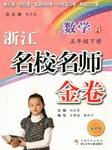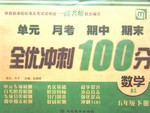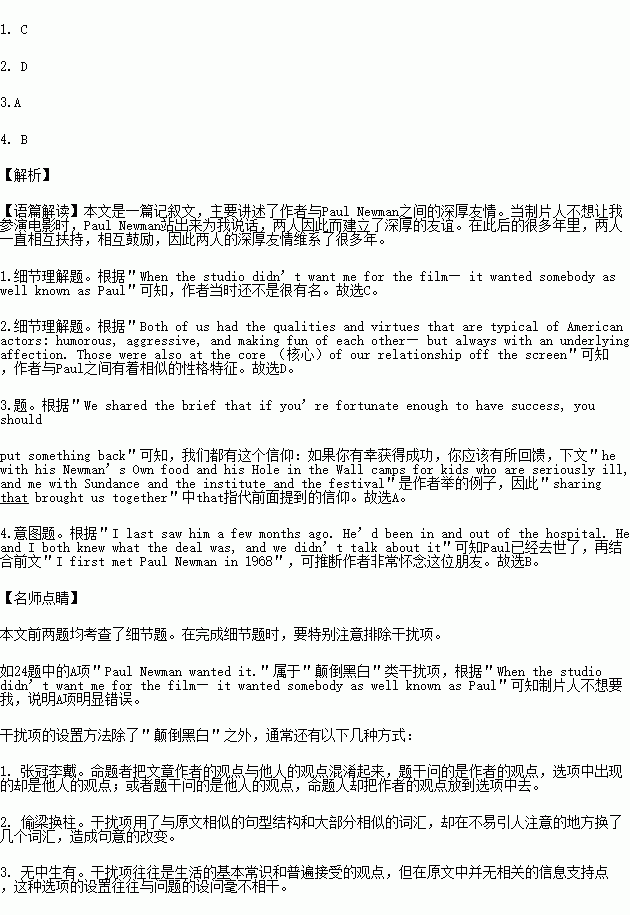题目内容
阅读理解
体裁 | 话题 | 词数 | 难度 | 建议时间 |
记叙文 | 我与Paul Newman之间的深厚友情 | 291 | ★★★☆☆ | 7分钟 |
(2017·新课标全国卷II,B)I first met Paul Newman in 1968, when George Roy Hill, the director of Butch Cassidy and the Sundance Kid, introduced us in New York City. When the studio didn’t want me for the film — it wanted somebody as well known as Paul — he stood up for me. I don’t know how many people would have done that; they would have listened to their agents or the studio powers.
The friendship that grew out of the experience of making that film and The Sting four years later had its root in the fact that although there was an age difference, we both came from a tradition of theater and live TV. We were respectful of craft(技艺)and focused on digging into the characters we were going to play. Both of us had the qualities and virtues that are typical of American actors: humorous, aggressive, and making fun of each other— but always with an underlying affection. Those were also at the core(核心)of our relationship off the screen.
We shared the brief that if you’re fortunate enough to have success, you should put something back— he with his Newman’s Own food and his Hole in the Wall camps for kids who are seriously ill, and me with Sundance and the institute and the festival. Paul and I didn’t see each other all that regularly, but sharing that brought us together. We supported each other financially and by showing up at events.
I last saw him a few months ago. He’d been in and out of the hospital. He and I both knew what the deal was, and we didn’t talk about it. Ours was a relationship that didn’t need a lot of words.
1.Why was the studio unwilling to give the role to the author at first?
A. Paul Newman wanted it.
B. The studio powers didn’t like his agent.
C. He wasn’t famous enough.
D. The director recommended someone else.
2.Why did Paul and the author have a lasting friendship?
A. They were of the same age.
B. They worked in the same theater.
C. They were both good actors.
D. They had similar characteristics.
3.What does the underlined word "that" in paragraph 3 refer to?
A. Their belief.
B. Their care for children.
C. Their success.
D. Their support for each other.
4.What is the author’s purpose in writing the text?
A. To show his love of films.
B. To remember a friend.
C. To introduce a new movie.
D. To share his acting experience.
 浙江名校名师金卷系列答案
浙江名校名师金卷系列答案 全优冲刺100分系列答案
全优冲刺100分系列答案Passage4(2016·天津,B)
体裁 | 话题 | 词数 | 难度 | 建议时间 |
记叙文 | 父与子 | 405 | ★★★☆☆ | 9分钟 |
Every man wants his son to be somewhat of a clone, not in features but in footsteps. As he grows you also age, and your ambitions become more unachievable. You begin to realize that your boy, in your footsteps, could probably accomplish what you hoped for. But footsteps can be muddied and they can go off in different directions.
My son Jody has hated school since day one in kindergarten. Science projects waited until the last moment. Book reports weren’t written until the final threat.
I’ve been a newspaperman all my adult life. My daughter is a university graduate working toward her master’s degree in English. But Jody? When he entered the tenth grade he became a "vo-tech" student(技校学生). They’re called "motorheads" by the rest of the student body.
When a secretary in my office first called him "motorhead", I was shocked. "Hey, he’s a good kid," I wanted to say. "And smart, really."
I learned later that motorheads are, indeed, different. They usually have dirty hands and wear dirty work clothes. And they don’t often make school honor rolls(光荣榜).
But being the parent of a motorhead is itself an experience in education. We who labor in clean shirts in offices don’t have the abilities that motorheads have. I began to learn this when I had my car crashed. The cost to repair it was estimated at $800. "Hey, I can fix it," said Jody. I doubted it , but let him go ahead, for I had nothing to lose.
My son ,with other motorheads, fixed the car. They got parts(零件)from ajunkyard, non-toasting toaster have been fixed. Neighbours and co-workers trust their car repair to him.
Since that first repair job, a broken air-conditioner, a non-functioning washer and a non-toasting toaster have been fixed. Neighbors and co-workers trust their car repairs to him.
These kids are happiest when doing repairs. They joke and laugh and are living in their own relaxed world. And their minds are bright despite their dirty hands and clothes.
I have learned a lot from my motorhead: publishers need printers, engineers need mechanics, and architects need builders. Most important, I have learned that fathers don’t need clones in footsteps or anywhere else.
My son may never make the school honor roll. But he made mine.
【题文1】What used to be the author’s hope for his son?
A.To avoid becoming his clone.
B.To resemble him in appearance.
C.To develop in a different direction.
D.To reach the author’s unachieved goals.
【题文2】 What can we learn about the author’s children?
A.His daughter does better in school.
B.His daughter has got a master’s degree.
C.His son tried hard to finish homework.
D.His son couldn’t write his book reports.
【题文3】The author let his son repair the car because he believed that_______.
A . His son had the ability to fix it.
B. it would save him much time.
C. it wouldn’t cause him any more loss
D. other motorheads would come to help.
【题文4】 In the author’s eyes, motorheads are _______.
A. tidy and hardworking B. cheerful and smart
C. lazy but bright D. relaxed but rude
【题文5】What did the author realize in the end?
A. It is unwise to expect your child to follow your path.
B. It is important for one to make the honor roll.
C. Architects play a more important role than builders.
D. Motorheads have greater ability than office workers.

